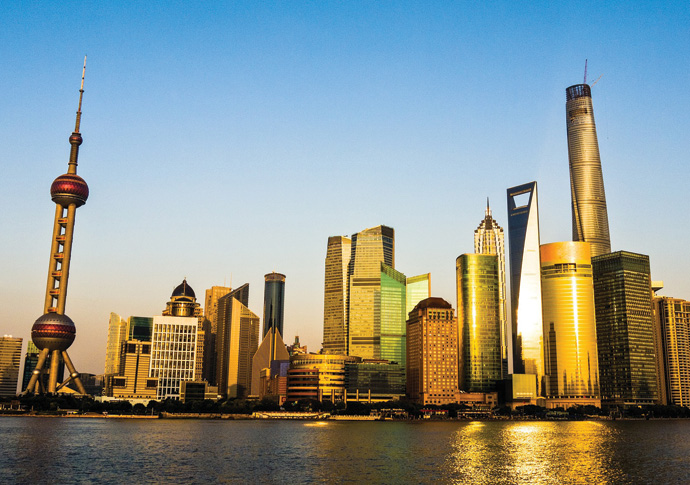Eastern premise
The increasing pressures on living standards are not inevitable says economist John Mills – ‘we are where we are because of policy decisions’. His latest book highlights the success story of China and the crucial policy of financing investment, manufacturing and export. Dan Carrier reports
Thursday, 1st December 2022 — By Dan Carrier

Pudong, Shanghai, China. Image by Andy Jarrige / Pixabay
POLITICAL and military power are the product of economic strength – and this should be taken into account when considering the performances of major economies today, and what it may mean for the next 50 years.
This is the premise at the heart of a new book by economist and businessman John Mills, the former Camden Labour councillor who once managed the borough’s finances and is the owner of international product firm JML.
Why The West is Failing, draws on economic history and data to show how the outlook in the west is grim compared to that in China – and why this matters.
Mills considers what form wealth creation and its application for the common good should take, and the differences between the east and west. He asks what it means for democracies if China’s growth continues, economically as well as in terms of population, and the west continues to stagnate and decline.
As history shows, periods of downturn prompt instability and the rise of authoritarian and fascistic regimes. Mills warns that the current direction of travel does not bode well.
If the Chinese economy continues to grow at the same rate it has recently, it will double in size every nine years. If it can keep that expansion going over the next 40 years, it may be the “almost unimaginable” 20 times larger than it is today.
“Combined with its very large population, this is going to produce a hegemony on a scale never envisioned before,” he adds.
As with all global dominators, China may not just lead the way in technological advances but would seek to promote its own political, social and cultural activity. This may be stymied, however, by the fact Mandarin is a tough language to master, Mills adds. But, simply put, the warning is that if the Chinese economy continues on its current trajectory and the west continues to decline, the Chinese political system could offer a threat to the ideals of democracy in the long term. “It could present a major challenge in ways that are outside the economic sphere,” he says.
“It seems likely that China will exercise very large economic and political power outside its own boundaries.
“Since the 1980s, there has been a steady stream of books and articles predicting disaster for China and forecasting that the Chinese Communist Party could lose autocratic control over the economy and its people.
“The economy was going to be dragged down by the inefficient public sector corporations. Higher living standards will lead to irresistible demands for political pluralism and freedom of thought. Communist Party control would soften and western style democracy would eventually prevail.”
Mills says this looks increasingly unlikely. The CP grip is tight, and rising living standards have shored up the autocrats’ popularity. Dissidents are quashed mercilessly, and possible tools for dissent such as social media are strictly controlled.
This book adds, chillingly, that the history of empire shows a booming economy and politically secure nation will build up military strength. The Chinese navy may be more powerful than the US in the near future.

John Mills
“It was military might, particularly the Royal Navy, that underpinned Pax Britannica in the 19th century, and US military might that underpinned the Pax Americana after World War II,” he says.
Offering a critique of economic history, with a focus on lessons from earlier phases of investment, Mills considers Japan’s postwar record compared to China’s more recent economic performance.
“Growth in eastern national economies has gone through two phases since 1945,” he writes.
“Japan saw consistent years of growth up to 1990. China, starting at a low base, did not enjoy the same levels.”
In 1980, the Chinese economy created around 4 per cent of global GDP (gross domestic product). In 2020, it is around 20 per cent.
Stats for large western economies are considered, with the following conclusion: “Why are western economies generally growing so slowly, compared to those in the east? Some of the reasons seem obvious, such as low level of investments,” Mills states.
“A key difference is using the financing of investment, manufacturing and export to drive their economies – in other words, putting money into sectors that bring returns – compared to the west, who have economies whose key drivers are consumption and debt.”
Policymakers can steer a different course. “The decline of western economies and the increasing pressures on living standards are not inevitable: we are where we are because of policy choices. And so to understand this, and consider what decisions can be made to reverse damaging trends, these policies need to be coldly examined and economic orthodoxy challenged,” he states.
The monetarist and neo-liberal projects have drained resources and squandered opportunities, creating instead vastly unequal societies that are unhappy and under threat.
Academic economics do not offer a simple solution, he adds, as it has “no satisfactorily settled view on what causes economic growth to take place and how it does so, and has consequently failed to provide clear guidance to policymakers.”
Evidence is offered that the crucial factors are a mix of high levels of investment, developing manufacturing sectors with high productivity with demand from other countries, creating a buoyant export market, by managing the exchange rate. This is in stark contrast to 40 years based on de-industrialisation and rising consumption as a percentage of GDP financed by debt.
Importantly, Mills asks how investment can provide a decent return. It isn’t solely about research and development, educa-tion and training. Spending on capital projects is a crucial partner.
Historically, there are areas of investment that provide better returns, and “are clustered around mechanisation, the application of technology and the use of power.”
In crude terms, Mills’ investment model could be applied to the growth seen through hydropower before the age of steam. The water mill would be a key economic element to a hamlet or village’s ability to thrive. It is a combination of power, mechanisation and an end product – milled flour – of worth.
If government can direct public and private spending into these areas, if they can manage the exchange rate to make products made in the UK affordable elsewhere, then the UK can enjoy economic success and provide the social benefits an ageing and sophisticated modern society requires.
If it doesn’t, then the ground will become ever more fertile for populist dictatorships to take hold and Age of Enlightenment values will appear to future generations to be a whimsical ideal, not a daily, if imperfect, reality.
• Why The West is Failing: Failed Economics and the Rise of the East. By John Mills. Polity Books, £15.99